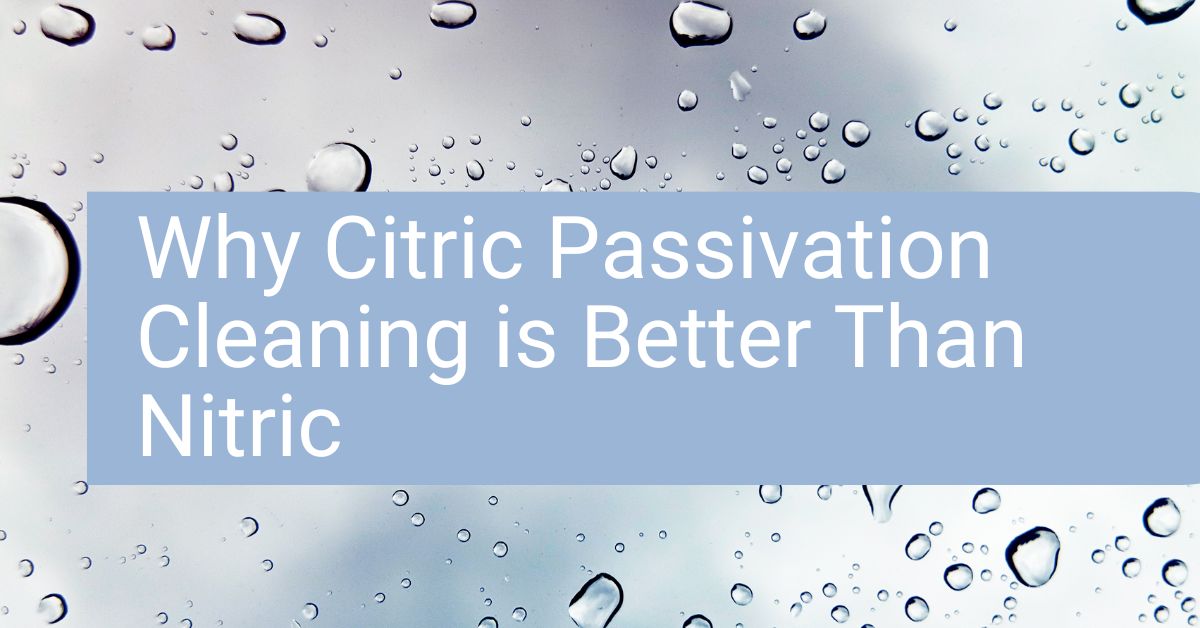Why Citric Passivation Cleaning is Better Than Nitric

When you’re looking for passivation cleaning solutions, there are generally three things to look for:
- You want it to work fast, with limited reaction time, and get the parts through production efficiently.
- The solution must be effective. You want the highest reasonable likelihood that the new passive layer is formed.
- It must be manageable. Industrial chemicals tend to have risks associated with their use, so we want a solution that does not cause undue risks or hazards.
The two most common options for passivation cleaning available today are citric acid and nitric acid, each with its own distinct upsides and downsides. Here’s why citric passivation cleaning is better than nitric.
Citric Passivation Cleaning is Safer Than Nitric
JAYCO’s citric acid passivation chemistry has been proven to be a vast improvement over traditional nitric acid formulations. It offers a safe stainless steel passivation process by forming a water-soluble complex with iron ions, preventing negative impacts.
Nitric acid passivation is extremely aggressive and presents potential risks to equipment, the environment, human operators and sensitive parts. Nitric acid passivation can require high temperatures, up to 160°F. Nitric can be run at 70°-90°F for some alloys.
Citric acid applications can be run at lower temperatures, from ambient to 120°F, and are diluted to much lower concentrations, 4% to 10% by volume. The process also takes much less time, making it much safer. Citric acid is naturally occurring and generally considered “edible” and “food-grade,” presenting a much less hazardous profile than nitric acid.
Lower Emissions, Easier Disposal and Liability
Citric acid produces no toxic gas emissions, is easy to dispose of and poses limited danger to those working through the passivation process. Citric acid is considered Generally Regarded As Safe (GRAS) and is commonly used in foods and beverages, making it environmentally compatible.
JAYCO’s citric acid passivation chemistry can often be disposed of into sanitary sewage systems with minimal waste treatment to meet current environmental agency approvals.
In contrast, nitric acid presents significant personnel hazards, creates toxic and corrosive gasses and requires costly waste treatment. This process can expose the user to long-term liability under regulatory agencies and cost the company significant amounts of money.
Ventilation Not Required
Nitric acid is a strong oxidizer that can produce harmful nitrogen oxide (NOx) fumes when it reacts with stainless steel, causing respiratory irritation and other health problems.
Citric is less aggressive on the stainless steel surface but is more effective at removing iron. Compared to nitric acid, citric acid removes iron and promotes oxide formation and oxide ratios.
While you don’t need ventilation when working with citric acid, you should still follow proper safety protocols when working with any chemicals, including citric acid.
Using Citric Acid Increases Efficiency
Compared to nitric acid, citric acid is a weaker acid that reacts less aggressively with the stainless steel surface and thus needs less time to dissolve and remove surface contaminants.
Note: the hotter the temperature, the shorter the processing time.
Per ASTM 967
Citric at 70°F to 120°F: 20 mins
Citric at 120°F to 140°F: 10 mins
Citric at 140°F to 160°F: 4 mins
Since citric acid isn’t as strong as nitric acid, it results in less waste material to dispose of, thereby increasing process efficiency.
Citric Acid Saves You Money
Citric acid is cheaper, generates less waste and requires less energy to heat the solution due to reduced time requirements. Its weaker chemical properties make it less corrosive, reducing the risk of equipment damage and extending tool life.
The Clear Winner: Citric Passivation Cleaning Outperforms Nitric
Using citric acid has numerous benefits when compared to a nitric acid passivation solution. JAYCO’s citric acid passivation chemistries can achieve passivation levels comparable to nitric blends while being safer, biocide-free and more employee-conscious.
Recommended JAYCO CitraPass Products
| JC CitraPass 5220 | Citric acid detergent for use in ultrasonic and immersion applications. Can be used to passivate 300 series, 17-4, and 400 series stainless steel alloys (ASTM 967 & AMS 2700, ASTM B600). Free rinsing and can be filtered to extend bath life. Contains no added biocide (1 year shelf life). Readily biodegradable. |
| JC CitraPass 3210 | Passivate 300 series, 17-4, and 400 series stainless steel alloys (ASTM 967 & AMS 2700, ASTM B600). Can be used for removal of fingerprints, light soils, and particulates. |
JAYCO Chemical Solutions is North America’s single-source provider of engineered cleaning solutions. From process analysis and application engineering to delivery and support, JAYCO improves operations for precision metal, medical, optical, UHV, space/aerospace and general manufacturing customers. For more information on JAYCO Chemical Solutions, our products and our markets, please call us at (814) 593-0022, or email us at info@jaycochem.com.
